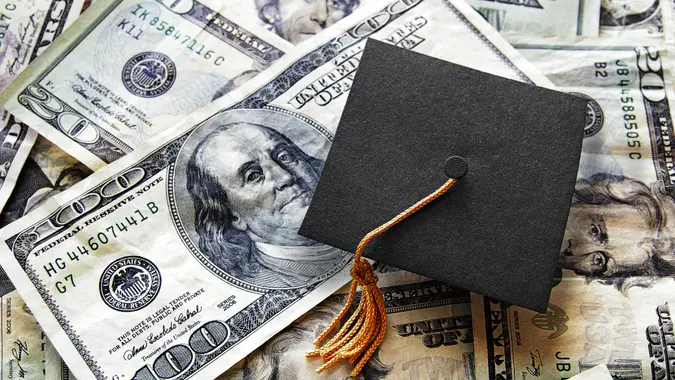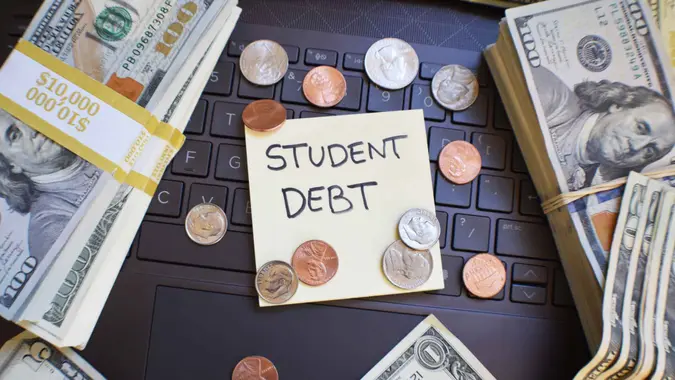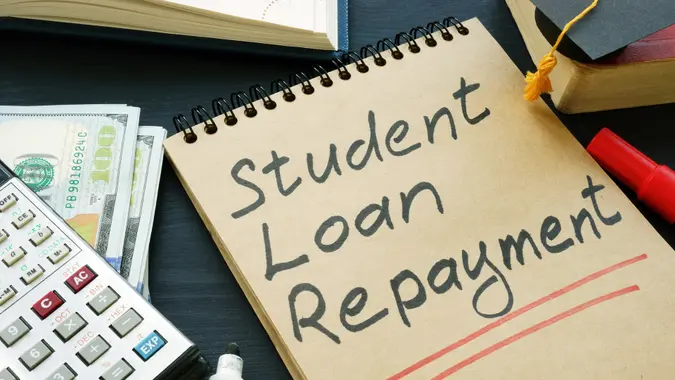Should Student Loans be Forgiven? New Poll Reveals Americans Are Divided

Commitment to Our Readers
GOBankingRates' editorial team is committed to bringing you unbiased reviews and information. We use data-driven methodologies to evaluate financial products and services - our reviews and ratings are not influenced by advertisers. You can read more about our editorial guidelines and our products and services review methodology.

20 Years
Helping You Live Richer

Reviewed
by Experts

Trusted by
Millions of Readers
The news on everyone’s mind over the past week — if not the past several years — has been the mounting student loan crisis in America. In late August, GOBankingRates polled readers on their thoughts, posing the question: Do You Think Student Loan Debt Should Be Forgiven?
Respondents could choose responses including “yes, all of it,” “yes, federal loans only,” “maybe,” “no” and “other.” Of the over 13,000 responses and counting, 64.8% of men did not think student loans should be forgiven, while women were less unilaterally decided, with 41% saying no, 40.8% saying that all of it should be forgiven, and 14.8% believing forgiveness should only apply to federal loans.
Other findings include 76% of married people who believe that student loans should not be forgiven, and 73.5% of homeowners who also said no (while 15.4% of homeowners said all of it should be forgiven).
In terms of age, those aged 18 to 34 largely favor forgiveness (39% said all of it, 24% said federal only and 34% said none at all). Respondents aged 55+ were the opposite, with 67.5% saying none should be forgiven while 22% said all of it should be canceled. Finally, respondents that lived in urban areas were twice as likely to respond that all student loan debt should be forgiven.
According to the White House, 43 million Americans carry at least some amount of student debt, exacerbated by the fact that the cost of tuition at four-year public and private institutions has nearly tripled since 1980.
In fact, the U.S. Department of Education has found that nearly all undergraduate students have around $25,000 in debt when they graduate, and many who have this debt leave school without a degree. In addition, the $25,000 threshold is at or around the typical starting salary in most states, per Zip Recruiter, which has caused a substantial financial burden for many who are just entering the workforce — and with the interest that continues to add up over the course of the loan, the problem is only compounded over time.
In total, the federal government has computed that there is currently $1.6 trillion in total student loan debt for all borrowers across the country. The situation has become so grave that President Biden made it a focal point of his campaign for the White House and delivered on the promise to tackle the situation on August 24 when he announced new relief measures. This included extending the moratorium on repayments through the end of 2022, and granting all borrowers that earn less than $125,000 annually $10,000 in debt cancelation ($20,000 total for anyone with a Pell Grant).
But there is certainly a divide when it comes to approval of the effort. Some in Washington have argued the equity of the program for those that don’t have student loan debt but other kinds of debt, and others have questioned who will foot the bill.
Another recent GOBankingRates poll asked what readers would do with their money if all of their student loan debt was forgiven, with the majority saying they would buy a house. Twenty-two percent chose that option, including 48.18% of 18- to 24-year-olds, and 45.33% of 25- to 34-year-olds. Putting the money towards other forms of debt was another popular choice (21.2% of respondents), especially for the older demographics in the poll, including 30.12% of 35- to 44-year-olds and 45.05% of 45- to 54-year-olds.
 Written by
Written by  Edited by
Edited by 

























